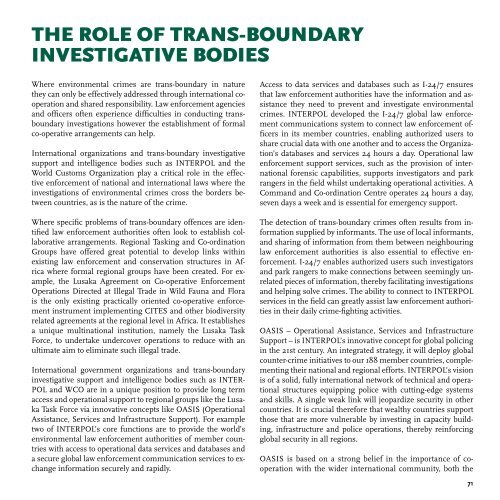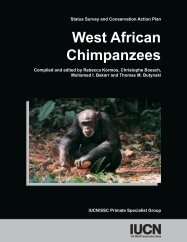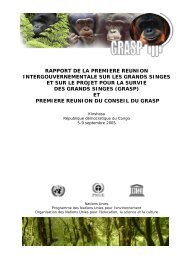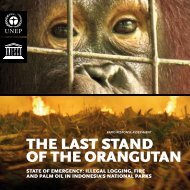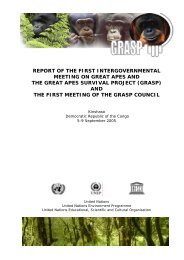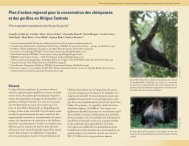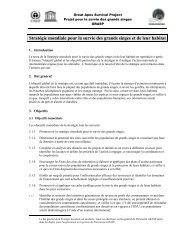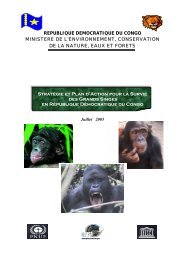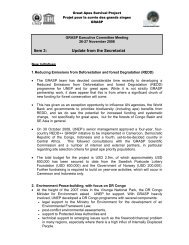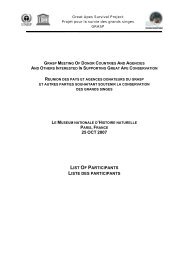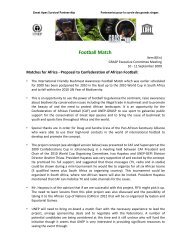THE LAST STAND OF THE - GRASP
THE LAST STAND OF THE - GRASP
THE LAST STAND OF THE - GRASP
You also want an ePaper? Increase the reach of your titles
YUMPU automatically turns print PDFs into web optimized ePapers that Google loves.
<strong>THE</strong> ROLE <strong>OF</strong> TRANS-BOUNDARY<br />
INVESTIGATIVE BODIES<br />
Where environmental crimes are trans-boundary in nature<br />
they can only be effectively addressed through international cooperation<br />
and shared responsibility. Law enforcement agencies<br />
and officers often experience difficulties in conducting transboundary<br />
investigations however the establishment of formal<br />
co-operative arrangements can help.<br />
International organizations and trans-boundary investigative<br />
support and intelligence bodies such as INTERPOL and the<br />
World Customs Organization play a critical role in the effective<br />
enforcement of national and international laws where the<br />
investigations of environmental crimes cross the borders between<br />
countries, as is the nature of the crime.<br />
Where specific problems of trans-boundary offences are identified<br />
law enforcement authorities often look to establish collaborative<br />
arrangements. Regional Tasking and Co-ordination<br />
Groups have offered great potential to develop links within<br />
existing law enforcement and conservation structures in Africa<br />
where formal regional groups have been created. For example,<br />
the Lusaka Agreement on Co-operative Enforcement<br />
Operations Directed at Illegal Trade in Wild Fauna and Flora<br />
is the only existing practically oriented co-operative enforcement<br />
instrument implementing CITES and other biodiversity<br />
related agreements at the regional level in Africa. It establishes<br />
a unique multinational institution, namely the Lusaka Task<br />
Force, to undertake undercover operations to reduce with an<br />
ultimate aim to eliminate such illegal trade.<br />
International government organizations and trans-boundary<br />
investigative support and intelligence bodies such as INTER-<br />
POL and WCO are in a unique position to provide long term<br />
access and operational support to regional groups like the Lusaka<br />
Task Force via innovative concepts like OASIS (Operational<br />
Assistance, Services and Infrastructure Support). For example<br />
two of INTERPOL’s core functions are to provide the world’s<br />
environmental law enforcement authorities of member countries<br />
with access to operational data services and databases and<br />
a secure global law enforcement communication services to exchange<br />
information securely and rapidly.<br />
Access to data services and databases such as I-24/7 ensures<br />
that law enforcement authorities have the information and assistance<br />
they need to prevent and investigate environmental<br />
crimes. INTERPOL developed the I-24/7 global law enforcement<br />
communications system to connect law enforcement officers<br />
in its member countries, enabling authorized users to<br />
share crucial data with one another and to access the Organization’s<br />
databases and services 24 hours a day. Operational law<br />
enforcement support services, such as the provision of international<br />
forensic capabilities, supports investigators and park<br />
rangers in the field whilst undertaking operational activities. A<br />
Command and Co-ordination Centre operates 24 hours a day,<br />
seven days a week and is essential for emergency support.<br />
The detection of trans-boundary crimes often results from information<br />
supplied by informants. The use of local informants,<br />
and sharing of information from them between neighbouring<br />
law enforcement authorities is also essential to effective enforcement.<br />
I-24/7 enables authorized users such investigators<br />
and park rangers to make connections between seemingly unrelated<br />
pieces of information, thereby facilitating investigations<br />
and helping solve crimes. The ability to connect to INTERPOL<br />
services in the field can greatly assist law enforcement authorities<br />
in their daily crime-fighting activities.<br />
OASIS – Operational Assistance, Services and Infrastructure<br />
Support – is INTERPOL’s innovative concept for global policing<br />
in the 21st century. An integrated strategy, it will deploy global<br />
counter-crime initiatives to our 188 member countries, complementing<br />
their national and regional efforts. INTERPOL’s vision<br />
is of a solid, fully international network of technical and operational<br />
structures equipping police with cutting-edge systems<br />
and skills. A single weak link will jeopardize security in other<br />
countries. It is crucial therefore that wealthy countries support<br />
those that are more vulnerable by investing in capacity building,<br />
infrastructure and police operations, thereby reinforcing<br />
global security in all regions.<br />
OASIS is based on a strong belief in the importance of cooperation<br />
with the wider international community, both the<br />
71


